Adaptive Hussars 2025 and defence plans in focus
Commander of Allied Joint Force Command – Brunssum visits Budapest
Text: HDF Defence Staff | Photo: Lajos Szabó | 12:52 September 3, 2025General Ingo Gerhartz, Commander, NATO Allied Joint Force Command – Brunssum received information about the national defence Exercise Adaptive Hussars 2025 and asked General Dr. Gábor Böröndi, Chief of HDF Defence Staff to share the lessons learned. At the meeting of military leaders held in Budapest, the delegations also reviewed the Hungarian contribution to NATO’s defence plans as well as the national defence and capability development plans.
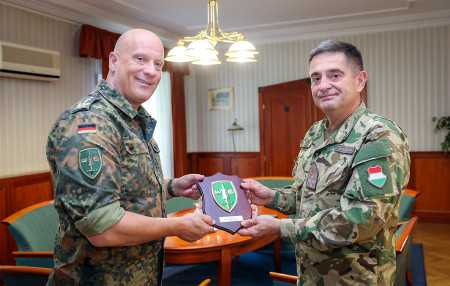
General Gerhartz took over as Commander of NATO Allied Joint Force Command – based in Brunssum, the Netherlands – in June, and after taking office, set the objective of visiting the countries under his command one by one. The timing of the Budapest meeting was especially important, since the day of his visit marked the start of the largest-scale exercise of the Hungarian Defence Forces since the 1989 regime change, during which Hungary as a whole will be put to the test to see how prepared it is for the implementation of NATO and national defence plans.
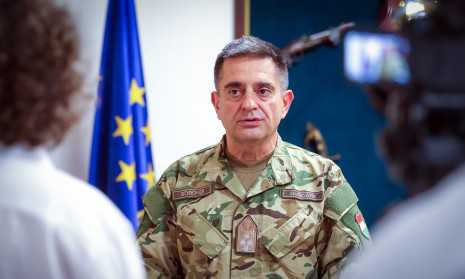
In his statement given after the meeting, General Dr. Gábor Böröndi pointed out that from Hungary’s viewpoint, one of NATO’s key military commanders had received first-hand information about the series of exercises which are going to introduce complex defence plans of the North Atlantic Alliance with the execution of their phases.
This year’s exercise is the third iteration of the series Adaptive Hussars, which is getting more complex year after year. In addition to the military level, this exercise also contributes to strengthening Hungary’s resilience at the whole-of-government and the overall society levels.
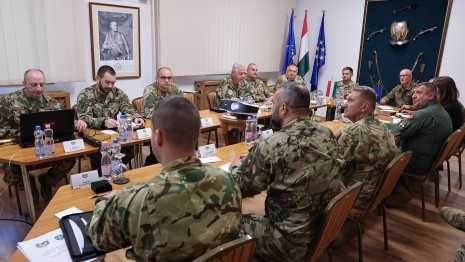
“It is very important that the superior NATO commander understand and see where Hungary is in the process of preparation” – said General Böröndi, adding that Major General Tibor Králik, Commander, Headquarters Multinational Division Centre (HQ MND-C) also held a briefing, so General Gerhartz had an opportunity to see, in their complexity, the movement and staging of NATO, Hungarian and international and forces as well as the planned schedule of events on the exercise.
The Hungary-based Headquarters Multinational Division – Centre (HQ MND-C) achieved its Full Operational Capability (FOC) in February 2025. This milestone ensures significant Hungarian contribution to the defence of NATO’s eastern flank, and to the strengthening of the Alliance’s deterrence and defence posture. General Gerhartz requested that the coordination with the Headquarters NATO Rapid Deployable Corps – Spain (HQ NRDC-ESP) become closer through the Székesfehérvár-based HQ MND-C.
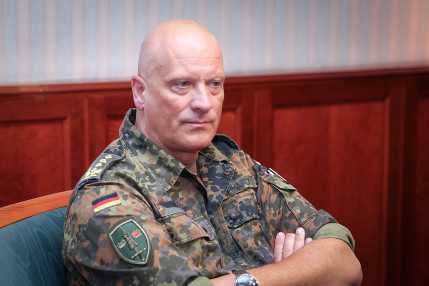
Logistics and host nation support were two unavoidable topics of discussion, with special regard to the fact that due to its geographical situation, Hungary plays a key role in providing regional mobility corridors. Commander JFC Brunssum prioritizes this issue and deems it very important.
“The staging and redeployment of NATO forces take place in Hungary and the infrastructure is used here too. We have reviewed and discussed the relevant plans and identified possible ways to promote the implementation of NATO’s staging plans” – said the Chief of Defence. He noted that we have great national responsibility for the way the staging and redeployment take place, and for its coordination with representatives of other nations.
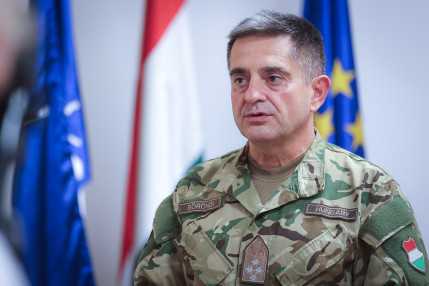
Hungary’s security situation is stable, and its membership in NATO and the EU further strengthen this security. Nevertheless, the deteriorating tendency of the global security environment does not leave the Central Eastern European region unaffected either. General Gerhartz’s visit to Budapest has contributed to Hungary’s clear presentation of its strategic aspirations: to simultaneously strengthen its own defence capabilities and increase its contribution to NATO’s common security.
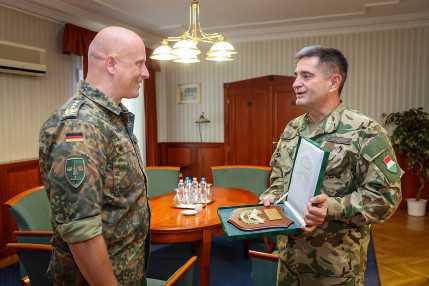
NATO Allied Joint Force Command – Brunssum
Based in Brunssum, the Netherlands, NATO Allied Joint Force Command – Brunssum (JFC Brunssum) is one of the strategically significant commands of the North Atlantic Alliance. As part of the integrated command structure of Alliance forces – in cooperation with JFC Naples and JFC Norfolk – it controls NATO operations, prepares and implements plans related to collective defence and coordinates military exercises and operational preparation.
Defending NATO’s eastern flank – including coordination of the Enhanced Forward Presence (eFP) – is among the overriding responsibilities of JFC Brunssum. Besides, it takes part in sustaining NATO’s rapid reaction capabilities and in preparing crisis management operations related to the collective security of member states. Thus, it coordinates multinational battle groups deployed on the eastern flank and oversees the activity of forces stationed in the areas of Estonia, Latvia, Lithuania, Poland, Slovakia and Hungary.
The activity of JFC Brunssum is significant for Hungary in several aspects. On the one hand, as part of the eFP framework controlled by JFC, Hungarian troops are also serving in the Baltic countries, so Hungary is directly connected with JFC Brunssum’s tasks. On the other hand, JFC Brunssum’s planning and operational activities contribute to Hungary’s security and to the strengthening of the Alliance’s deterrence and defence posture in the region.
Bringing his decades-long experience, General Ingo Gerhartz was appointed Commander JFC Brunssum in June 2025. He started his career as a fighter pilot of the German Air Force, logged a total of over 3000 flight hours and flew combat sorties in Afghanistan. His career is marked by several leadership assignments; during his seven-year term as Chief of the German Air Force, he successfully concentrated his efforts on improving operational readiness and strengthening multinational cooperation. He is credited with modernizing Germany’s air defence capabilities, preparing the procurement of F-35 fighter aircraft and leading Alliance-level exercises. His extensive experience in NATO and his strategic perspective guarantee that JFC Brunssum continues to be one of the key operational centres of the Alliance.